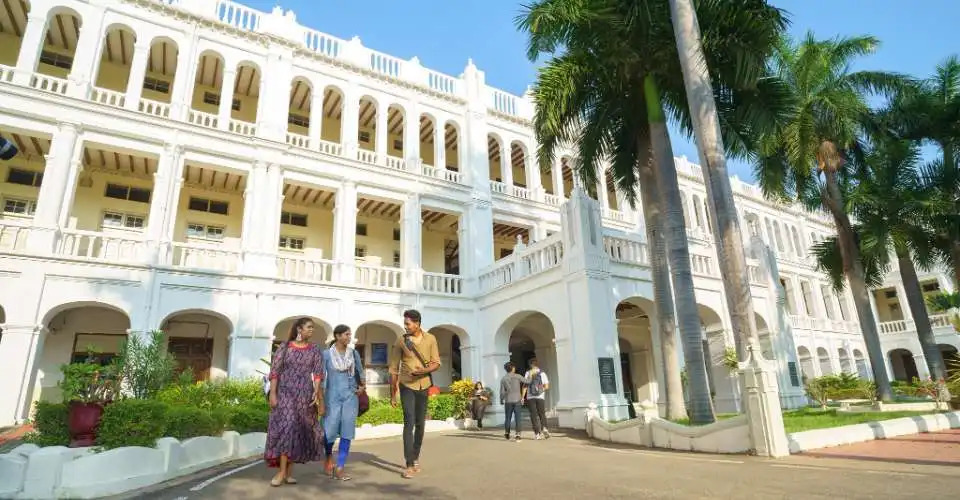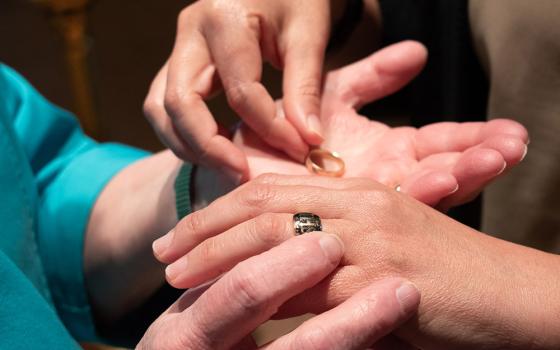
Students are seen in front of Loyola College, in Chennai, Tamil Nadu state of India. The Madras High Court in Chennai on March 27 told two state-run universities to approve the appointment of 66 assistant professors and a principal pending since 2023 at five Christian-run institutions, including Loyola College. (Photo: Loyola College Facebook page)
Catholic officials have welcomed a ruling by the top court in Tamil Nadu state, in southern India, reaffirming the autonomy of higher education institutions run by religious minority groups.
"We are very happy that the high court has rightly upheld the constitutional provisions for minority higher education institutions to select their staff, which is essential for their existence as minority institutions with core values," said Maria Charles, a Catholic priest and secretary of the Indian bishops' Office of Education and Culture.
The response came after the Madras High Court in the Tami Nadu state capital, Chennai, ordered two state-run universities on March 27 to approve the appointment of 66 assistant professors and a principal at five Christian-run colleges, which had been pending since 2020.
The court ruling followed a petition from the Women's Christian College, the Madras Christian College, Loyola College, and the Stella Maris College, all four in Chennai.
Meanwhile, Sacred Heart Arts & Science College in Tindivanam challenged Annamalai University's refusal to allow it to appoint a principal.
The state pays staff salaries in such state-aided colleges, but only after the university under which they function approves the staff appointments.
The Madras University blocked the appointment of the 66 assistant professors selected by the four Chennai-based colleges.
Christian colleges challenged Madras University's decision, resulting in the current order.
"This is a remarkable order. It will benefit all minority institutions across the state of Tamil Nadu," said Catholic nun and lawyer Sr. Mary Sowmi Rexi, who was among the team of lawyers who argued the case in court.
"Many appointments of assistant professors, associate professors and principals have been pending since 2020 after the government insisted on complying with a controversial 2018 UGC circular," the nun from the Sisters of St. Anne of Tiruchirappalli told UCA News on March 28.
The universities defended their decision, accusing the Christian-run institutions of violating the 2018 circular issued by the University Grants Commission (UGC), a statutory body that maintains standards in higher education in India.
The Christian-run institutions argued that the 2018 circular violated the constitutional right of religious minorities to manage their own affairs.
The universities and the UGC defended their stance, saying it was to ensure quality education, and applied to all. They also denied any discrimination against minority-run education institutions.
Advertisement
India's constitution confers minority status on Christians, Muslims, Sikhs, Jains, Buddhists, and Parsees.
The judge, N Anand Venketesh, who issued the ruling said autonomy for minority-run institutions was crucial to safeguard their very purpose.
"The dawn of India's independence heralded a profound commitment to safeguarding the rights of minorities installing a sense of security and apprehensions about their future in a newly sovereign nation," the judge said.
The court further said that Article 30 (1) of the Constitution "guarantees minorities the right to establish and administer education institutions of their choice."
"This provision was not merely a legal formality. It was a promise made by the framers to protect the cultural and educational identities of minority communities," the court said
"In the instances where these rights are threatened, it is imperative that constitutional courts intervene decisively to reaffirm this commitment, ensuring the foundational ideals of justice and equality are upheld", the court added.
The court also directed both universities to approve the selections made by the petitioners within four weeks.
"We never make any compromise on the academic qualifications and other qualities required for appointing a person in our academic institutions," Charles told UCA News on March 28, adding that the Church-run institutions uphold government guidelines to improve and impart quality education.
In September last year, the Madras High Court passed an order reaffirming a constitutional provision that guarantees religious minorities the right to establish and administer educational institutions for the welfare of their community.
Christians make up 2.3 percent of the 1.4 billion people in Hindu-majority India.





